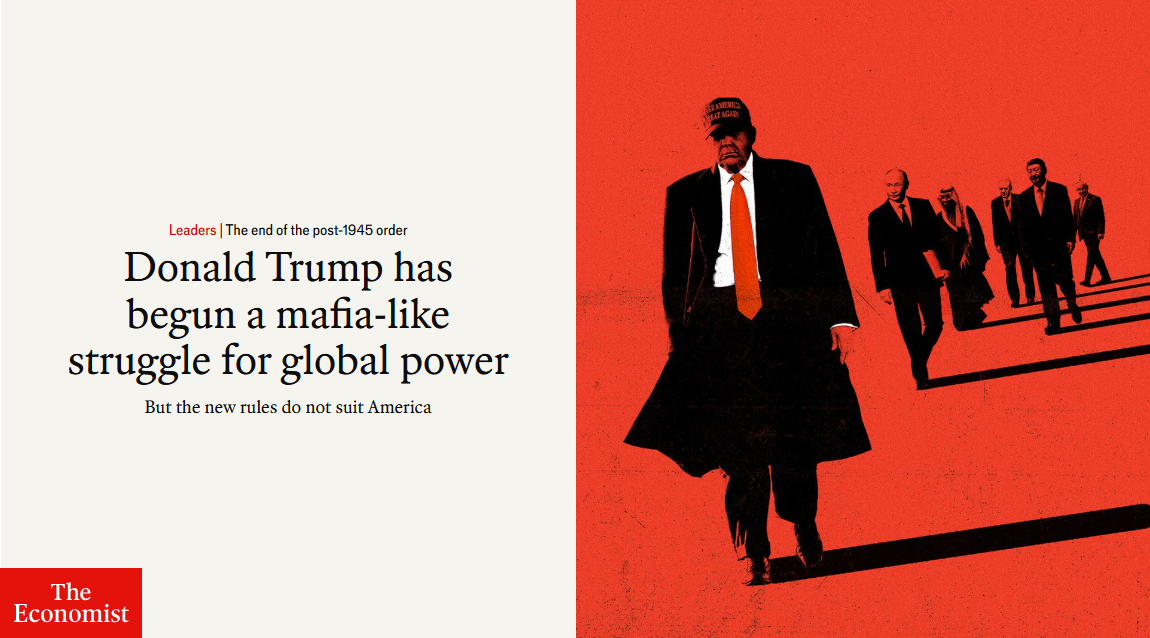The international situation in recent years features turbulence and change, with the United States playing an increasingly prominent destructive role. As the second Trump administration’s policies unfold, the negative impacts have become clear.

The confrontational mindset of Donald Trump and his administration is poisoning the atmosphere of international cooperation. Over the past decade, as Trump stepped to the forefront of the American political stage, the confrontational thinking and belligerent tendencies in his personality have been on prominent display to the world. In his view, the world consists of black-and-white binary opposition — “If you are not 100 percent obedient to me, you will be 110 percent my enemy.” In Trump’s first term, this way of thinking was part and parcel of his philosophy of governance. He not only provoked competition with other major powers but also attempted to achieve benefits and dominance for the U.S. through decoupling and maximum pressure.
Although it has not been long since the start of Trump’s second-term, he and his administration have pushed the confrontational mindset to new extremes. Domestically, on key social issues such as immigration, education and abortion, their policies have sharply heightened the red-blue divide, racial polarization and federal-state tension, further fueling the long-standing “second civil war” narrative.
Externally, the Trump administration not only continues to pressure its perceived rivals but also pushes away many traditional allies. The confrontational drama with Ukraine’s President Volodymyr Zelenskyy in the White House was seen by the whole world. Repeated “merger” remarks targeting neighboring Canada agitated allies. And rhetoric about annexing Greenland and seizing Ukrainian mineral resources shocked Europe. The spread and escalation of confrontational thinking by the U.S. undoubtedly further reduces the space for international cooperation amid ongoing turbulence.
The spillover effects of domestic disorder in the United States have increased turbulence in the international situation to unprecedented levels. Since the end of the Cold War, the U.S. has positioned itself as a hegemonic, dominant power, and its foreign strategy has been built to promote American ideology and concepts across various domains. Ironically, the increasingly severe domestic chaos in recent years has also produced more direct spillover impacts on the international situation as a byproduct of the hegemon.
In his second term, Trump has been using the domestic fentanyl epidemic as a pretext to blame other nations and wage a tariff war. Disputes between domestic factions over Trump’s “big and beautiful” spending bill and concerns over U.S. treasury bond safety have introduced new uncertainties into the international financial market. More alarmingly, as he has reversed the “diversity, equity and inclusion” policies of Democratic administrations, Trump has launched massive campaigns against scientists and prestigious universities and forced them to abandon international research collaborations by terminating federal funding and suspending visa procedures.
Such actions have extensively damaged international exchanges in technology and the humanities, and they constitute an upgraded version of Trump’s tech war against major powers and his latest counter-globalization move. The violence in downtown Los Angeles blatantly exposed the turbulent side of American society to the international community, prompting the New York Times to comment that America is “no longer a stable country.” French economist Thomas Piketty, author of “Capital in the Twenty-First Century,” believes that the U.S. is “no longer a reliable country.” An unstable and unreliable U.S. has become a hallmark of an increasingly turbulent world.
The collapse of traditional political checks, balances and social order within the U.S. and the potential loss of international order triggered by its foreign strategies, will deal a heavy blow to peace and development. With the Trump administration’s “America first” obsession, countries will be forced to seek self-preservation through new alliances. Their demands for international public benefits will increasingly outweigh their contributions.
The failure of various international organizations and global governance deficits will inevitably become more pronounced. In areas such as climate change, global public health and the security of artificial intelligence, it is not hard to imagine risk factors erupting suddenly to threaten the safety of mankind. The potential risk that the international community could descend into disorder may also signify the emergence of a new era of great conflicts.
With hegemonic power recklessly abandoning rules, norms and international law, the use of force, coercion and deception may become the unavoidable choice for more nations. A report by the Stockholm International Peace Research Institute noted that global military spending in 2024 constituted the largest expansion since the end of the Cold War, with increases in more than 100 countries and regions. With direct military conflicts and large-scale wars between regional powers emerging, the task of maintaining international peace seems increasingly arduous.
